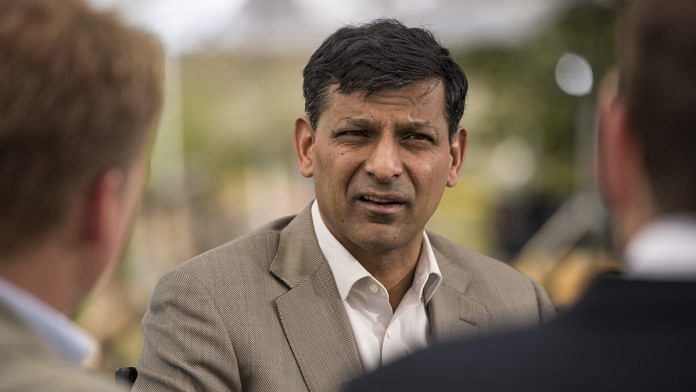New Delhi: Former Governor of the Reserve Bank of India Raghuram Rajan Tuesday warned states that opting for the old pension scheme over the new would ultimately cripple their finances.
Rajan was speaking at the Delhi launch of the book Breaking the Mould: Reimagining India’s Economic Future, co-authored by him and economist Rohit Lamba.
The former central bank chief also spoke about the larger trend of political parties competing with each other to offer non-targeted cash transfers and other financial incentives to woo voters.
“Direct benefit transfers, when targeted, can help those at the very bottom,” Rajan said, in response to a question from the moderator about states increasingly opting for cash transfers. “They can help feed children, and send them to school.”
“The problem is when these transfers are untargeted and there’s competition between parties over how much to give,” he added. “A no-go area is switching from the New Pension Scheme (NPS) to the Old Pension Scheme (OPS). This will only bankrupt the government down the line.”
So far, five states — Rajasthan, Chhattisgarh, Jharkhand, Punjab and Himachal Pradesh — have reverted to the OPS. At the time the decision was taken, Rajasthan, Chhattisgarh and Himachal were led by the Congress, while the party was part of the ruling coalition in Jharkhand. The Aam Aadmi Party (AAP), also in the Opposition coalition, governs Punjab.
Governments have recently changed in Rajasthan and Chhattisgarh, where the BJP stomped to power in the recently-concluded Assembly elections.
While there has been no official announcement yet, it is expected that the new governments will restore the NPS as that has been the stand of the BJP at the Centre and in the states it governs.
The main difference between the NPS and OPS is how the pension payable to retired civil servants is financed. Under OPS, the government pays the retiree their pension using its own funds — that is, the retiree does not contribute anything towards their pension during the course of their service. Further, the government itself needs to make the payments only once the employee retires.
Under the NPS, government employees contribute 10 percent of their basic salary (including dearness allowance), and the government contributes 14 percent towards their pension, throughout the course of the employee’s service. The accumulated funds are then used to pay for the pension.
Reversion to OPS ‘major step backwards’, says RBI
Economists are of the view that the OPS may save the government and the employees money right now, since they don’t have to make regular contributions to the pension fund, but it imposes a debilitating future cost to government finances when they have to make the pension payments.
The Reserve Bank of India, in particular, has been a vocal opponent of the OPS.
“The return to the Old Pension Scheme (OPS) by a few States and reports of some other States moving in the same direction would exert a huge burden on State finances and restrict their capacity to undertake growth enhancing capital expenditures,” the central bank had said in a report in January.
The RBI further said that a reversion to OPS by the states would be “a major step backwards”, “compromising the interest of future generations”.
During the book discussion, Rajan, who was governor of the RBI from September 2013 to September 2016, also spoke about how states announced farm-loan waivers without thinking through the financial implications.
“They would do it before elections, but afterwards would ask me: ‘Sir, kaise karein’ (Sir, how can we do it),” Rajan recounted.
Notably, in the run-up to the Chhattisgarh elections this year, outgoing Congress chief minister Bhupesh Bhagel had announced his government would waive farm loans if voted back to power.
(Edited by Tikli Basu)
Also read: Inflation rises to 3-month high of 5.55 pc in Nov on firming food prices



